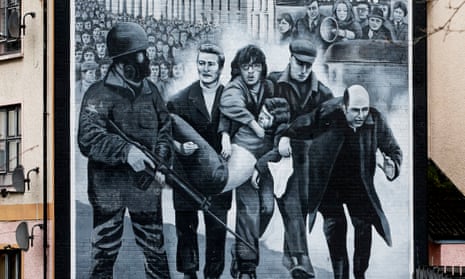Almost half a century after the 1972 Bloody Sunday killings inflamed Northern Ireland’s Troubles, prosecutors in Derry will this week announce whether any Parachute Regiment soldiers should face trial for murder.
The decision by the Public Prosecution Service (PPS) on whether to bring charges over the army shooting of civil rights demonstrators is likely to provoke fresh rounds of recrimination – either among army veterans or within the nationalist community.
Members of the Paras 1st Battalion, which had been sent into Derry’s Bogside on 30 January 1972, shot dead 14 unarmed civilians. Their deaths propelled a generation of enraged republicans into the ranks of the Provisional IRA.
The damning conclusion in 2010 of Lord Saville, the chair of the Bloody Sunday inquiry, was that none of the dead had been carrying a gun, no warnings were given, no soldiers were under threat and the troops were the first to open fire. That marked a final declaration of innocence for the victims of the largest British military killing of civilians on UK soil since the Peterloo massacre in 1819.
His verdict initiated a police investigation, the questioning of surviving soldiers and a referral to Northern Ireland’s PPS. The suspects have only been identified so far by the sequence of letters used in the inquiry.
The Police Service of Northern Ireland examined allegations against 18 paratroopers. One of those was Soldier F, who admitted shooting dead four protesters: Michael Kelly, Paddy Doherty, Barney McGuigan and a fourth man, believed to be William McKinney.

Following a high court legal challenge by their lawyers, almost all of the veterans were interviewed by PSNI detectives in Britain rather than Northern Ireland where, they said, they feared for their safety even in detention. Five of the original 18 have since died. The Paras have repeatedly claimed they were responding to IRA attacks.
Ahead of the announcement in the city’s Guildhall on Thursday morning, expectations in Derry are high. There has been unconfirmed speculation that as many as four of the former soldiers, all now in their 60s and 70s, will be charged with murder.
Julieann Campbell, of the Bloody Sunday Trust, whose uncle Jackie Duddy was killed in 1972, told the Guardian: “People are nervous but hopeful.
“The feeling is quite positive because they are putting the families first in the process. We could be looking at a range of charges.”
John Kelly, whose 17-year-old brother Michael was killed on Bloody Sunday, said: “We are entitled to justice. I’m hopeful. I believe there will be prosecutions. Soldier F was responsible for four deaths including my brother’s. I want to see him convicted.”
In an interview with the BBC last week, a former soldier, Sergeant O, expressed no regret for what happened. He had previously told his interviewer: “We were under fire. We started looking for targets and started dropping them. Shooting them. The mood between the blokes was not elation but a job well done.” He stood by the remark that it was a job well done.
That defiance infuriates relatives of the victims. “A job well done?” John Kelly said. “That’s the type of people who we are dealing with.”
Suspicions have been further ignited by the bizarrely timed remarks of Karen Bradley, the Northern Ireland secretary, who told MPs on Wednesday that deaths caused by police and soldiers during the Troubles were “not crimes”.
Bradley apologised the next day for using the “wrong” language but not before there were infuriated calls for her to resign from relatives of Bloody Sunday victims and even from Lady Nuala O’Loan, who was formerly police ombudsman for Northern Ireland.
The threat of prosecution comes amid mounting political controversy over how to deal with the legacy of the Troubles. Two years ago the defence select committee recommended that police and soldiers should not be prosecuted in relation to historic killings and torture allegations. It called for an amnesty for those who served in Northern Ireland between 1969 and 1998.
The defence secretary, Gavin Williamson, last year established a dedicated team in the MoD to consider whether there should be a statute of limitations for service personnel.

The two-year time limit on prison sentences for Troubles-related terrorism offences negotiated under the Good Friday agreement does not apply to crimes committed before the first Emergency Provisions Act in 1973. That distinction could yet be changed by legislation.
Asked whether changes on immunity to protect soldiers from allegations of historic offences were planned, an MoD spokesperson said: “We are considering how best to improve the current system and ensure that there is no unfair and disproportionate focus on former members of the armed forces.”
The past in Northern Ireland is hard to escape. An inquest into the lesser known Ballymurphy army shootings in west Belfast in August 1971 has this month been hearing harrowing evidence of alleged army brutality.
Edward Butler, who was 11 years old at the time, told the Ballymurphy inquest on Wednesday that he recalled hearing a young man cry out in pain as he was being carried away by soldiers. According to Butler, they dropped the young man, a soldier swore at him, pulled out a handgun and shot him dead.
And on the day the PPS reveals its prosecution decisions in Derry, the supreme court in London will hear an appeal by lawyers on behalf of another former soldier, Dennis Hutchings, who has been charged with the attempted murder of a man with learning difficulties in 1974 during an army patrol near Benburb, County Tyrone. Hutchings is objecting to facing trial in a no-jury, Diplock court.
The legacy of Bloody Sunday, like so many killings during the Troubles, will not fade away quietly.
